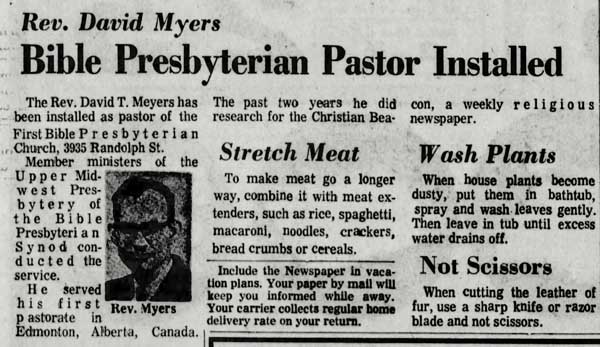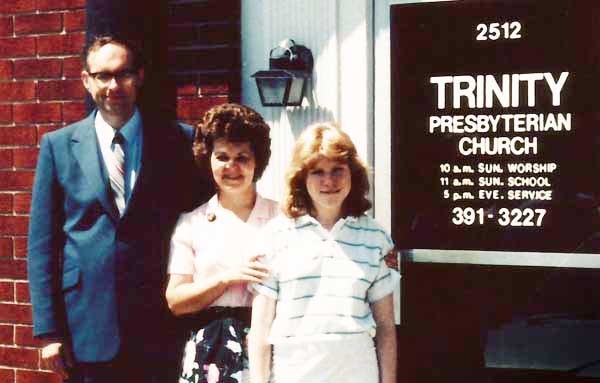STUDIES IN THE WESTMINSTER SHORTER CATECHISM
by Rev. Leonard T. Van Horn
Q. 70. Which is the seventh commandment?
A. The seventh commandment is, Thou shalt not commit adultery.
Q. 71. What is required in the seventh commandment?
A. The seventh commandment requireth the preservation of our own and our neighbor’s chastity, in heart, speech, and behavior.
Scripture References: Exodus 20:14; I Thessalonians 4:4-5; I Corinthians 7:2; Matthew 5:28; Ephesians 4:29.
Questions:
1. What is meant by the word “chastity”?
The word “chastity” means a hatred of all uncleanness, no matter whether it be in the body or in the mind and affections (Job 31:1),
2. What is the two-fold duty involved in the keeping of this commandment?
The two-fold duty involves both ourselves and others, there is an equal responsibility here.
3. How can the seventh commandment be broken?
It can be broken by an act, but also by impure thoughts; and it should be recognized that it is from within the heart of a man that sin comes. Therefore the real source of violations of this commandment is the sinful heart.
4. How can we preserve both our own and our neighbor’s chastity?
We can best preserve it by keeping in the right relationship with our Lord. If we do that, then there will be certain characteristics about us such as: loving with a pure heart (I Pet. 1:22); speaking in a way that will only edify ourselves and our neighbor (Eph. 4:29); behaving in such a way that we are always a testimony for Jesus Christ, never giving any cause for criticism in this area (I Pet. 3:1, 2).
5. How can we best keep in that right relationship with the Lord in this regard?
We must be watchful over our hearts and spirits, over our eyes and ears. We must be diligent in our walk with the Lord remembering we can never take even “minute vacations” from our watchfulness. We must follow after temperance in all things. We must be careful of the company we keep, the marriages we contract. We must seek the mind of Christ with regard to things sinful and unclean. We must study the Word and pray daily.
6. Why must we be careful to keep this commanment?
We must be careful to keep it because it is a command or God, but one which in this age is bypassed time and time again by society.
THE LAW OF CHASTITY
Our Lord well knew the dangers to which we would be subjected when He had His servant pray: “Create in me a clean heart, O God; and renew a right spirit within me. Cast me not away from thy presence; and take not thy Holy Spirit from me. Wash me thoroughly from mine iniquity, and cleanse me from my sin.” He knew that our only method of living was by His grace. He knew that His Word dare not be left out of our approach to life.
When we ask the question as to why there are so many divorces, wrecked homes, broken hearts, and all kinds of vice and immorality in the world of today, we must remember that the difficulty lies in ignorance of, or rebellion against, God’s will. People have lost knowledge that the married state in God’s sight is holy—holy in origin, in essence, and in purpose. It is holy in origin because God Himself instituted it. It is holy in essence because God intends that it shall be a life-long covenant between one man and one woman. It is holy in purpose because it is God’s institution for the propagation of the human race, the living together of two people, all to the glory of God.
Today we must be on guard, especially against the false ideas about marriage, about morality. The “New Morality” is one of the worst lies of Satan ever to be spread in this country. And to think it is being spread by the church itself! Actually it is nothing new. It is nothing but a rejection of the Ten Commandments and this is what the true church of God has been living with for years—the rejection of the Word of God. The difference today is that the proponents of immorality are becoming bolder, for they realize now there are few who will stand against them. How deplorable it is to think they are playing right into the hands of the Communists whose first rule has always been: “Corrupt the youngl”
As believers we need to be on our guard in two ways. FIrst, that none of these so-called new rules creep in unawares into our lives and we begin to excuse wrong behaviour with the old “everybody is doing it” sort of approach. Second, that we might raise up the standard of the Word against them. We must declare the Word of God against all unchastity. We must remind people again and again that our Lord puts His finger on the difficulty: “For out of the heart proceed evU thoughts…” We must preach Jesus Christ to a dying world! There is no other method of dealing with the problem. The “New Morality” is taking hold because people do not know Jesus Christ as Saviour and Lord. Such should be our constant messagel








